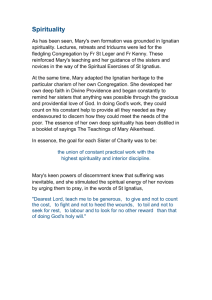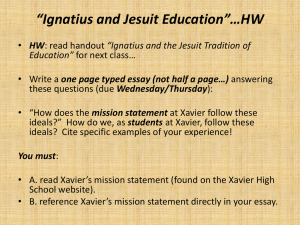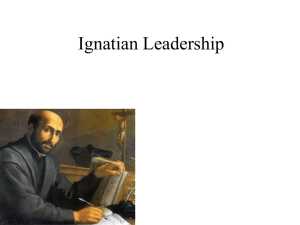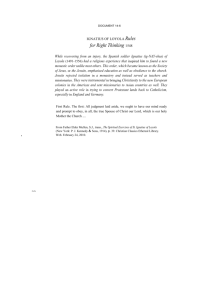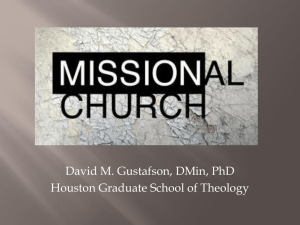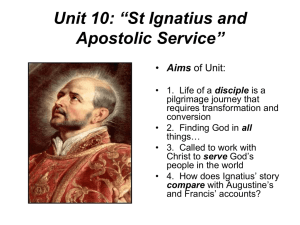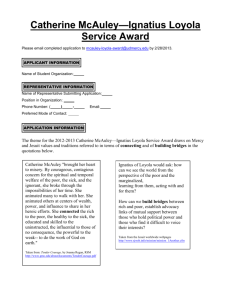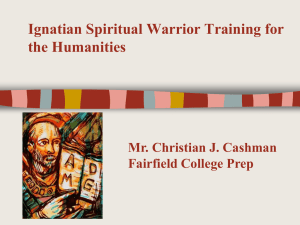Syllabus - Programs for the Theological Exploration of Vocation
advertisement
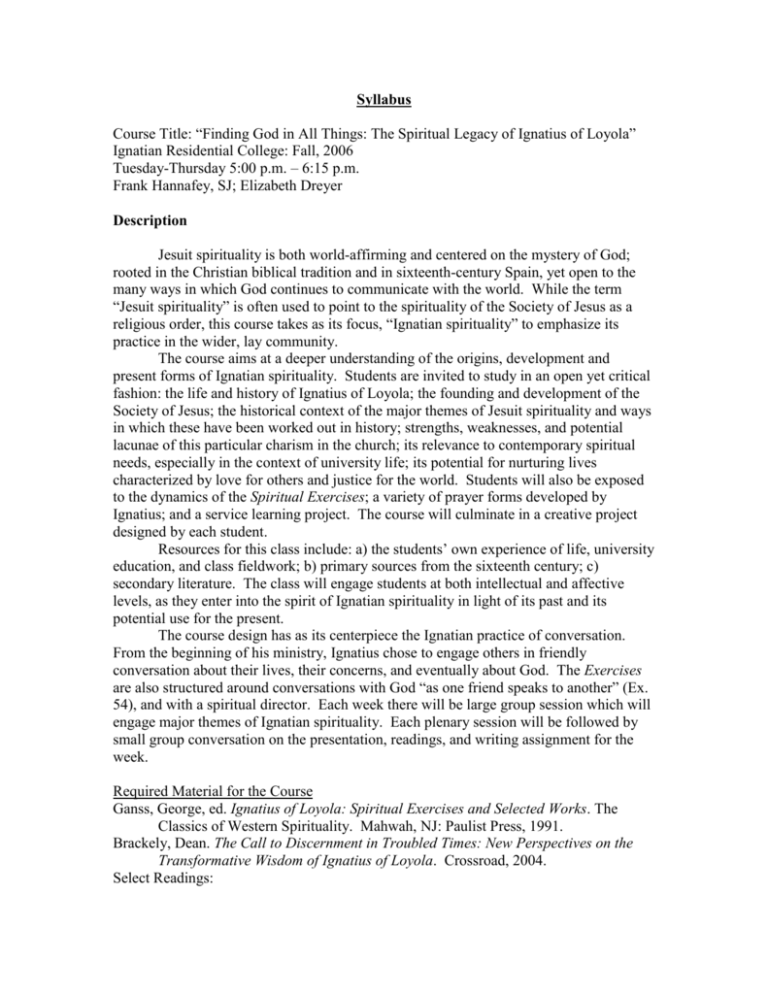
Syllabus Course Title: “Finding God in All Things: The Spiritual Legacy of Ignatius of Loyola” Ignatian Residential College: Fall, 2006 Tuesday-Thursday 5:00 p.m. – 6:15 p.m. Frank Hannafey, SJ; Elizabeth Dreyer Description Jesuit spirituality is both world-affirming and centered on the mystery of God; rooted in the Christian biblical tradition and in sixteenth-century Spain, yet open to the many ways in which God continues to communicate with the world. While the term “Jesuit spirituality” is often used to point to the spirituality of the Society of Jesus as a religious order, this course takes as its focus, “Ignatian spirituality” to emphasize its practice in the wider, lay community. The course aims at a deeper understanding of the origins, development and present forms of Ignatian spirituality. Students are invited to study in an open yet critical fashion: the life and history of Ignatius of Loyola; the founding and development of the Society of Jesus; the historical context of the major themes of Jesuit spirituality and ways in which these have been worked out in history; strengths, weaknesses, and potential lacunae of this particular charism in the church; its relevance to contemporary spiritual needs, especially in the context of university life; its potential for nurturing lives characterized by love for others and justice for the world. Students will also be exposed to the dynamics of the Spiritual Exercises; a variety of prayer forms developed by Ignatius; and a service learning project. The course will culminate in a creative project designed by each student. Resources for this class include: a) the students’ own experience of life, university education, and class fieldwork; b) primary sources from the sixteenth century; c) secondary literature. The class will engage students at both intellectual and affective levels, as they enter into the spirit of Ignatian spirituality in light of its past and its potential use for the present. The course design has as its centerpiece the Ignatian practice of conversation. From the beginning of his ministry, Ignatius chose to engage others in friendly conversation about their lives, their concerns, and eventually about God. The Exercises are also structured around conversations with God “as one friend speaks to another” (Ex. 54), and with a spiritual director. Each week there will be large group session which will engage major themes of Ignatian spirituality. Each plenary session will be followed by small group conversation on the presentation, readings, and writing assignment for the week. Required Material for the Course Ganss, George, ed. Ignatius of Loyola: Spiritual Exercises and Selected Works. The Classics of Western Spirituality. Mahwah, NJ: Paulist Press, 1991. Brackely, Dean. The Call to Discernment in Troubled Times: New Perspectives on the Transformative Wisdom of Ignatius of Loyola. Crossroad, 2004. Select Readings: 1. Gonzalez, Justo L. A History of Christian Thought: From the Protestant Reformation to the Twentieth Century. Nashville: Abingdon Press, Chapter 1: pp. 13-28. 2. O’Malley, John. “Early Jesuit Spirituality: Spain and Italy.” In Christian Spirituality: Post-Reformation and Modern, eds. Louis Dupré and Don E. Saliers. NY: Crossroad, 1989. Pp. 3-27. Vol. 18 of World Spirituality: An Encyclopedic History of the Religious Quest, ed. Ewert Cousins. 3. Hansen, Ron. “The Pilgrim: Saint Ignatius of Loyola.” In A Stay Against Confusion: Essays on Faith and Fiction (New York: HarperCollins, 2001: Perennial edition, 2002), 73-104. Also in A Tremor of Bliss: Contemporary Writers on the Saints. Ed. Paul Elie. NY: Harcourt Brace, 1994, pp.110-146. 4. Farina, John. “Gaining Self-Mastery: Ignatius of Loyola.” In Great Spiritual Masters: Their Answers to Six of Life’s Questions. NY: Paulist Press, 2002. 5. Hutchinson, Gloria, “Ignatius of Loyola: The Sensual Christian.” In Six Ways to Pray From Six Great Saints. 1982. 6. Meissner, William. “The Mind of Ignatius Loyola.” America (July 27, 1991). 7. David Lonsdale, “Ignatian Prayer,”; “The Spiritual Exercises”; “Ignatian Spirituality and Lay Christians,” and Current Issues in Ignatian Spirituality”, in Eyes to See, Ears to Hear: An Introduction to Ignatian Spirituality (Maryknoll: Orbis, 2000) pp. 110-141; 190-223. 8. Tim Muldoon, “How To Get the Most out of Your Workouts,” in The Ignatian Workout: Daily Spiritual Exercises for a Healthy Faith (Chicago: Loyola Press, 2004), pp. 45-66. 9. Matter E. Ann. “Lourdes: A Pilgrim After All” in Minding the Spirit: The Study of Christian Spirituality, eds. Elizabeth A. Dreyer and Mark S. Burrows (Baltimore: Johns Hopkins University Press, 2005). 10. Philibert, Paul J. “Pilgrimage to Wholeness: An Image of Christian Life.” 11. Dyckman, Katherine and Elizabeth Liebert. The Spiritual Exercises Reclaimed: Uncovering Liberating Possibilities for Women. NY: Paulist, 2001. 12. Nantais, David E. “Whatever!” is Not Ignatian Indifference: Jesuits and the Ministry to Young Adults. Studies in the Spirituality of Jesuits 36/3 (Fall 2004). 13. Ahlgren, Gillian T. W. “Women and the Pursuit of Holiness in Sixteenth-Century Spain.” Chapter 1 Teresa of Avila and the Politics of Sanctity. Ithaca and London: Cornell University Press, pp. 6-31. 14. Anselment, Ken,“Soul Doctor”, Marquette University Alumni Magazine (Fall, 2005), 12-15. 15. Traub, James. “The Statesman: Why, and how, Bono Matters”, The New York Times Magazine (Sept. 18, 2005), 80ff. 16. Ruffing, Janet. “Ignatian Mysticism of Service: Ignatius of Loyola and Pedro Arrupe,” in Mysticism and Social Transformation, ed. Janet K. Ruffing. Syracuse, New York: Syracuse University Press, 2001. Pp. 104-128. Course Requirements 1. Class attendance and active participation in class conversation that shows a) evidence of careful reading of assignments; b) posing of questions emerging from this reading; c) visible efforts to relate material to the present in critical ways. Three or more unexcused absences will automatically lower your grade one step. Substantive participation in class conversation will enhance your grade, lack thereof will lower it. 2. Weekly writing assignments; occasional leadership role for class conversation. 30% 3. Mid-term exam. 30%. 4. Final project. (See end of syllabus for suggestions) 40%. Due at the time the exam for this class is scheduled or before. +++++ “If we were to trust the nightly news and the sitcoms, we might conclude that we are just lonely, violent creatures destined to spend our lives getting, spending, and bged-hopping. In this book, we have considered an alternative.” D. Brackley, The Call to Discernment in Troubled Times, p. 253. Sept 7 (Plenary) Introduction to the Course: Thoughts about “conversations” and beginning this new course at Fairfield. -- Introductions -- Syllabus; Requirements; Themes; link to IRC. --What should students/faculty/staff at a Jesuit University know about Ignatius of Loyola and Jesuit spirituality and why? -- In class exercise: Take a few moments to jot down an experience in which you chose to go “above and beyond the call of duty” for a person, a cause, a commitment. Reflect on this experience. What brought it about? Who was involved? How did you reflect about what to do? Why do you think you made the choice you did? How did this make you feel about yourself? Did you get any response/feedback from anyone? Discuss. Assignment for Sept. 12 1. Do a Google Image search under “Ignatius of Loyola.” Take a few moments to study the various portraits of Ignatius. What do you see in them? When was each created? 2. Read Ron Hansen, Ron. “The Pilgrim: Saint Ignatius of Loyola.” In A Stay Against Confusion: Essays on Faith and Fiction (New York: HarperCollins, 2001: Perennial edition, 2002), 73-104. Also published in A Tremor of Bliss: Contemporary Writers on the Saints. Ed. Paul Elie. NY: Harcourt Brace, 1994, pp.110-146. 3. Write a 2-3 page paper on a) your initial impressions of Ignatius as a person; b) your questions, expectations, attitudes, fears vis-à-vis this course. September 12 (Break out) Discuss goals of the course; student input; questions. Assignment for Sept. 14 1. Read John Farina, “Gaining Self-Mastery: Ignatius of Loyola.” In Great Spiritual Masters: Their Answers to Six of Life’s Questions. NY: Paulist Press, 2002. 2. Read Gloria Hutchinson, “Ignatius of Loyola: The Sensual Christian.” In Six Ways to Pray From Six Great Saints. 1982. 3. Read William Meissner, “The Mind of Ignatius Loyola.” America (July 27, 1991). September 14: (Plenary) Ignatius of Loyola in his time. Assignment for Sept. 19 1. Read: Gonzalez, Justo L. A History of Christian Thought: From the Protestant Reformation to the Twentieth Century. Nashville: Abingdon Press, Chapter 1: pp. 13-28. 2. Read a scholarly article of your choice or a chapter in a book on any aspect of sixteenth-century Spain. 3. Write a 2-3 page analysis of how elements of the world of the sixteenth century may have influenced Ignatian spirituality. September 19 (Break out) Discuss papers on Ignatius and his historical context. Assignment for Sept. 21 Read: 1. Read: Ken Anselment, “Soul Doctor”, Marquette University Alumni Magazine (Fall, 2005), 12-15. 2. Read sections from Traub, James. “The Statesman: Why, and how, Bono Matters”, The New York Times Magazine (Sept. 18, 2005), 80ff. [There is a new book out on U2: One Step Closer by Christian Scharen (Grand Rapids, Mich.: Brazos Press, 2006). Scharen reflects on the Christian faith of band members’ Irish background and how U2 fits within the longer Christian tradition of voices that point us to the cross, to Jesus, and to the power of God’s ways in the world. He explores the music’s honest spiritual questioning with comparisons to King David, St. Francis, Dietrich Bonhoeffer, and Dorothy Day.] September 21 (Plenary) Ignatius of Loyola (1491-1556): Autobiography Assignment for Sept. 26 1. Read: Ignatius of Loyola: “Autobiography” (Ganss, pp. 66-111) Everyone must read sections 92-94. Remaining material will be divided into smaller sections assigned to different groups of students. 2. Write a 2-3 page paper: Ignatius’s dream was to become a great knight – a common desire for medieval men of means. After his conversion, this quest becomes ordered to the Kingdom of God. He relied on his dreams and fantasies; reflected on his desires. Take a moment to reflect about your hopes for your own life. In the spirit of sections 92-94 of Ignatius’s “Autobiography” discuss your own dreams and deepest desires about what you want do with your life and who you want to become. September 26: (Break out) Discuss elements in papers, “Soul doctor”, “Bono”, and Ignatius’s Autobiography Assignment for Sept. 28 Reading on Society? September 28 (Plenary) The Founding and Development of the Society of Jesus Assignment for Oct. 3 1. Read E. Ann Matter, “Lourdes: A Pilgrim After All” in Minding the Spirit: The Study of Christian Spirituality, eds. Elizabeth A. Dreyer and Mark S. Burrows (Baltimore: Johns Hopkins University Press, 2005). 2. Philibert, Paul J. “Pilgrimage to Wholeness: An Image of Christian Life.” October 3 (Break out) Discuss: What was the value of being a “pilgrim” for Ignatius? Does this concept have any currency in our own culture? One paragraph proposal for final project due. Assignment for October 5: 1. Read Brackley, Foreword (pp. ix-xix) and Chapters 1-5. 2. Write a 2-3 page paper: identify what Brackley means by freedom; offer two other common ideas about freedom and then offer your own analysis of elements you see in true vs. pseudo freedom. “We urgently need a critical mass of such people to make this century the century of solidarity and turn the swelling tide of misery, violence, and environmental crisis.” D. Brackley, The Call to Discernment in Troubled Times, p. 9. October 5 (Plenary) Film: “Motorcycles Diaries” Evening session and discussion in library video room. “Motorcycle Diaries”: “The Motorcycle Diaries” -- Directed by Walter Salles. Saga of two young men who take a trip from Buenos Aires through Chile, across Andes into the Peruvian Amazon. One is a 29- year-old biochemist, Alberto Granado; the other was a 23-year-old medical student, Ernesto Guevara. “One reason to explore the past is to try to rediscover an elusive sense of forgotten possibility, and in Mr. Salles’s hands what might have been a schematic story of political awakening becomes a lyrical exploration of the sensations and perceptions from which a political understanding of the world emerges. What ‘The Motorcyle Diaries’ captures, with startling clarity and delicacy, is the quickening of Ernesto’s youthful idealism, and the gradual turning of his passionate, literary nature toward an as yet unspecified form of radical commitment.” A.O. Scott, New York Times review (Sept. 24, 2004), E1. Assignment for October 10: Read: Articles in The New Dictionary of Catholic Spirituality (ed. Michael Downey). This volume is in the reference section of the library. a) “Spirituality, Christian” by Walter Principe: pp. 931-38. b) “Spirituality, Christian (Catholic), History of” by Richard Woods: pp. 938-46. October 10: (Break out) Student led discussion. Assignment for October 12: 1. Read article in The New Dictionary of Catholic Spirituality (ed. Michael Downey). This volume is in the reference section of the library. 1. “Ignatian Spirituality” by Harvey Egan: pp. 521-29. 2. Write a 2-3 page paper on your understanding of Christian spirituality and some of the pro’s and con’s of making use of this tradition today. October 12 (Plenary) Christian Spirituality and Tradition Assignment for October 17: 1. Read Lonsdale, “The Spiritual Exercises,” pp. 126-141. 2. Read selections from the Exercises (Ganss, pp. 114-214): Group 1: #23: Pple and Foundation; Group 2: #101-109: Incarnation; Group 3: #121-126: Application of the Senses; The Exercises are divided into “four weeks”: Week 1: creative love, sinfulness, mercy Week 2: Christian discipleship and vocational choices Week 3: the suffering and death of Christ and its meaning for Christian existence Week 4: the resurrection and its contemporary readings; being a contemplative in action Elements of the deep structure of the Exercises: a. Principle and foundation b. Sense of sin c. Freedom d. Discernment (field of study, friends, lifestyle) e. Jesus f. Mission October 17 (Break out) “The Spiritual Exercises” Reflect in detail on an experience in which you gained mastery of some skill over a significant period of time -- a sport; an instrument; a work skill; a hobby; a social skill. Then reflect on the same process as applied to the spiritual life. “Spirituality is a practice, a regular endeavor through which we come to build our lives on the love of God – to order our lives according to God’s plan for us.” Tim Muldoon, The Ignatian Workout, p. xiv. Assignment for October 19: 1. Read selections from the Exercises: a) #136-47: Two Standards; b) Election. 2. Sign up to work on one of the four weeks of the Exercises. Choose a major theme of your assigned week and write a 2-3 page paper exploring the meaning of this theme in your own words; re-design the “exercises” for your assigned week with university students in mind. What “exercises” would you choose to accomplish the week’s particular goals in a contemporary context for young adults? October 19 (Plenary) The Exercises Assignment for October 24: Read Brackley, Chapters 7-10. October 24: (Break out) Student-led discussion on vocation. Many think about their calling life without any reference to God. Others think that call comes as an unambiguous summons from God that can be easily sorted out and then obeyed. More helpful approaches attend to one’s gifts, lived experiences, and opportunities and acknowledge the complexity of discerning one’s calling in life. It is dangerous to link specific vocations (the single state, marriage, orders, religious life) with God’s will in simplistic ways. Rather these “states” might be seen as lifestyles, “patterns we develop as we attempt to live out our vocation.” (E. and J. Whitehead, Wisdom of the Body). Thus, persons live out a range of vocations within their marriages, or singleness or religious commitments across a lifetime. Vocation involves the question: “how does God want me to love?” and presumes sustained reflection on what it means to love well. Vocation draws us onward not by certainties but by questions: What is most necessary in our lives? For what are we living? What does it mean to be a human person? “Something’s your vocation if it keeps making more of you” (Gail Godwin, Evensong). A discerned call to a lifestyle or a career is but the inviting edge of vocation. Assignment for October 26 Study for mid-term examination. October 26 (Plenary) Mid-term examination. Assignment for October 31: Read Brackley, Chapters 24-26. October 31: (Break out) Discuss exams; introduction to prayer forms. Assignment for November 2 1. Read Lonsdale, “Ignatian Prayer” in Eyes to See, Ears to Hear. 2. Write a 2-3 page paper, articulating what you consider to be the key elements in prayer, how Ignatius understood it. Back up statements with appropriate documentation. November 2 (Plenary) Practicum on Prayer “For him [Ignatius], solitude and lengthy prayer are not the chief standards by which to evaluate our prayer, nor is prayer always the preferred means to union with God.” Brackley, p. 244. This class will be held in the Arrupe Center/University Chapel Assignment for November 7 Read: Brackley, Chapters 6, 14-17 on discernment. Discerning God’s will means striving to find God in all the realities of life – the inner dimensions of our mind, heart, spirit, imagination and memory; and the outer aspects of our relationships, community, work, leisure and world. November 7 (Break out) Discuss Brackley, Chapters 6, 14-17 Detailed, 1-2-page proposal for final project due with resources listed. Assignment for Nov. 9 1. Read Exercises: “Rules for Discernment” (#313-336). 2. Read Exercises: Examen (#24-43). 3. Write a two-page case study of a common, serious moral issue in university life situation and apply the rules for discernment to it. November 9 (Plenary) Discernment Assignment for Nov. 14 1. Read Gillian Ahlgren, Gillian T. W. “Women and the Pursuit of Holiness in Sixteenth-Century Spain.” Chapter 1 Teresa of Avila and the Politics of Sanctity. Ithaca and London: Cornell University Press, pp. 6-31. 2. Dyckman, Katherine et al. The Spiritual Exercises Reclaimed: Uncovering Liberating Possibilities for Women. NY: Paulist Press, 2001. Chapters 1, 2, and Appendix. (course packet). Pp. 3-50; 329-348. November 14: (Break out) Discuss Ignatius and women. Assignment for November 16: Read: Ignatius’s letters (Ganss, pp. 324-341). November 16 (Plenary) Women in medieval culture and in Ignatius’s life Assignment for November 21: Read Lonsdale, “Ignatian Spirituality and Lay Christians,” and “Current Issues in Ignatian Spiritualtiy”, pp. 190-223. November 21 (Break out) Student-led discussion. November 23 Thanksgiving. No class. Assignment for Nov. 28 Read Tim Muldoon, “How to Get the Most out of Your Workouts,” in The Ignatian Workout, pp. 45-66. November 28 (Break out) Discuss Muldoon reading. Assignment for Nov. 30: 1. Read Read Brackely, Chapters 21-23. 2. Read sections from Ignatius’s Spiritual Diary (Ganss, pp. 229-270) November 30 (Plenary) Ignatian the Mystic: The Role of the Heart/Affections: The Gift of Tears Assignment for December 5 Read Brackley, Chapters 18-20. December 5 (Break out) Student-led discussion: Progress report on final projects. Assignment for December 12 1. Read Brackley, Chapters 11-13. 2. Read Exercises: Contemplation To Attain Love (Ex. # 230- 237. Ganss, pp. 17677). 3. Write a 2-3 page paper on some aspects of the following: a) In what ways do you see the Ignatian tradition as useful (or not) to contemporary seekers of a spiritual life. b) Comment on your experience at Fairfield University in light of what you have learned in this course. c) Assess your learning and growth from the course. What changes took place? What perspectives already held were reinforced, challenged? December 12 (Plenary) Finding God in All Things: Ignatian Spirituality Today Reflections on the semester. Final evaluation. Suggested Course Projects “I always feel as if I stood naked for the fire of Almighty God to go through me – and it’s rather an awful feeling. One has to be so terribly religious to be an artist.” (D. H. Lawrence, cited in Steiner, 1989, p. 228). “Write as if you were dying. At the same time, assume you write for an audience of terminal patients. That is, after all, the case. What would you begin writing if you knew you would die soon? What could you say to a dying person that would not enrage by its triviality?” 30 (Annie Dillard, The Writing Life New York: Harper, 1990, p. 68). 1. A select number of students may apply to engage in the 19th annotation version of the Exercises. These students will write a final reflective paper on this experience, relating it to what they have learned in the course: Ignatius’s life and the founding of the Society of Jesus; the structure of the Exercises, theological, spiritual, and cultural themes of the course. 2. Do a scholarly analysis of a specific theme. Consult bibliography at end of syllabus for starters. Possible themes: a) b) c) d) e) f) g) The nineteenth annotation. Resources include: Ravier, André. A Do-It-at-Home Retreat: The Spiritual Exercises of St. Ignatius of Loyola According to the “Nineteenth Annotation,” trans. Cornelius Michael Buckley (San Francisco: Ignatius Press, 1991); Joseph Tetlow, Choosing Christ in the World: Directing the Spiritual Exercises According to Annotations Eighteen and Nineteen: A Handbook. (St. Louis, MO: The Institute of Jesuit Sources, 1989); Smith, Carol Ann and Eugene F. Merz. Moment by Moment: A Retreat in Everyday Life (Ave Maria Press, 2002). Jesuit martyrs and their female companions Women and Ignatian spirituality today. The Practice of Spiritual Direction Historical Treatment of some aspect of the Jesuit tradition The concept of vocation and how Ignatian spirituality responds to discerning one’s call Explore the apophatic and kataphatic strains in Ignatian spirituality. 3. Interview 5-6 persons who have made the Exercises; analyze this data in light of the structure and goals of the Exercises, contemporary spirituality, and relevant themes from the course; comment on insights gained from the experience. 4. Engagement in a service-learning project with a social justice component (minimum 25 hours during the semester). Write a paper based on student’s experience; in-depth conversations with mentors involved in the project; analysis of the social problem addressed; difficulties encountered; joys, insights gained; and how these relate to their own spirituality and to Ignatian spirituality. 5. Design and implement a two-day workshop for students who have chosen to become part of the Ignatian Residential College. Paper should include a) a rationale for its contents; b) an analysis of the audience and how to take their experience into account; c) theoretical backdrop for each aspect of the retreat; d) detailed plan of how each aspect of the retreat would be executed. Paper should show in-depth mastery of the relevant themes of the course. 6. Write and perform a play on some aspect of Ignatius’s life or of Ignatian spirituality in a university context (Group project). 7. Write, design and perform a project related to the arts that reflects or symbolizes what you have learned about Ignatian spirituality in this course. Explanatory rationale showing mastery of course themes must accompany the project. 8. Design a weekend retreat for university college seniors. See #2 for specific guidelines. Explanatory rationale showing mastery of course themes must accompany the project. 9. Do a thorough, scholarly reading and analysis of a significant primary text written by Ignatius or important secondary volumes related to course themes. 10. Read some of the texts read by Ignatius that influenced his thought and analyze how they do so. A. Writings that influenced Ignatius himself: The Golden Legend by Jacopo de Voraigne Life of Christ by Rudolph of Saxony Imitation of Christ by Thomas à Kempis B.Influence on Exercises: Ludolph of Saxony’s Vita Jesu Christi, who was influenced by: Meditationes vitae Christi (late 13th early 14th Italian Franciscan document often attributed to Bonaventure, and certainly influenced, if not written by him (O’Malley, 46). 11. Identify the major images used by Ignatius in his writings, analyze their source and how and to what end Ignatius uses them, e.g., the image of the warrior. 12. Identify the psychological presuppositions in the Exercises; assess ways in which this psychology might be helpful or problematic for modern readers (may be of interest to psychology majors; also #13 below). 13. Study and explicate key points in William Meissner’s assessment of Ignatius’s own psychology in Ignatius of Loyola: The Psychology of a Saint. 14. Explore the role of women in the sixteenth-century church and how Ignatius related to women. Hugo Rahner, Saint Ignatius Loyola: Letters to Women. 15. From a selection of Ignatius’s writings, ascertain the virtues which he felt were the most important and situate his understanding of virtue in his time and context. Recommended Reading: Books Albom, Mich. Tuesdays with Morrie: An Old Man, a Young Man, and Life’s Greatest Lesson. New York: Doubleday, 1997. Barry, William A. Contemplatives in Action: The Jesuit Way (Paulist Press, 2002). _____. Allowing the Creator to Deal With the Creature: An Approach to the Spiritual Exercises of Ignatius of Loyola (Paulist Press, 1994). _____. Finding God in All Things: A Companion to the Spiritual Exercises of St. Ignatius. Ave Maria Press, 1991. _____. Letting God Come Close: An Approach to the Ignatian Spiritual Exercises. Chicago: Loyola University Press, 1991. Bellafiore, I. Michale, and Michael Sparough. Ignatius Loyola: The Story of the Pilgrim. Chicago: Loyola University Press. Video. Brackley, Dean. The Call to Discernment in Troubled Times. Crossroad. Byrne, Brendan. The Hospitality of God: A Reading of Luke’s Gospel (Collegeville: The Liturgical Press, 2000). Caraman, Philip. Ignatius Loyola: A Biography of the Founder of the Jesuits (Harper & Row, 1990. Dyckman, Katherine and Elizabeth Liebert. The Spiritual Exercises Reclaimed: Uncovering Liberating Possibilities for Women. NY: Paulist, 2001. Egan, Harvey. Ignatius Loyola the Mystic. Wilmington, DE: Michael Glazier, 1987. Emeth, Elaine V. “Lessons from the Holocaust: Living Faithfully in the Midst of Chaos.” Weavings 13/2 (March/April 1998): 16-26. Endo, Shusako. Deep River [themes of pilgrimage]. English, John J. Spiritual Freedom: From an Experience of the Ignatian Exercises to the Art of Spiritual Guidance. 2nd ed. Chicago: Loyola University Press, 1995. Fleming, David. Draw Me into Your Friendship: A Literal Translation and A Contemporary Reading of the Spiritual Exercises. St. Louis: Institute of Jesuit Sources, 1996. _____. A Spiritiuality for Contemporary Life: The Jesuit Heritage Today. St. Louis. _____. The Spiritual Exercises of St. Ignatius. The Institute of Jesuit Sources. Gray, Howard. “Joy and Friendship in the Fourth Week.” Hample, Patricia. [book on pilgrimage] Hauser, Richard J. Finding God in Troubled Times. Loyola University Press. Hebblethwaite, Margaret. Finding God in All Things. London: Collins, 1987. Hughes, Gerard W. God of Surprises. London: Darton, Longman and Todd, 1985. Imoda, Franco. The Spiritual Exercises and Psychlogy: The Breadth and Length and Height and Depth. Chicago: Loyola Press, 1996. Ivens, Michael. Understanding the Spiritual Exercises: Text and Commentary. Trowbridge, Wiltshire, UK: Cromwell Press, 1998. Kolvanbach, Peter-Hans. “The Jesuit University in the Light of the Ignatian Charism.” _____. The Road from La Storta (Institute of Jesuit Sources, 2000). _____. “The Service of Faith and the Promotion of Justice in American Jesuit Higher Education.” Link, Mark. Vision 2000: Praying Scripture in a Contemporary Way. Allen, Tex.: Tabor Publishing, 2002. Mariani, Paul. Thirty Days: On Retreat with the Exercises of St. Ignatius. Viking Compass, 2000. Martin, James. How Can I Find God? Triumph Books, 1997. _____. In Good Company: The Fast Track from the Corporate World to Poverty, Chastity and Obedience. Franklin, Wis.: Sheed & Ward, 2000. Matter E. Ann. “Lourdes: A Pilgrim After All” in Minding the Spirit: The Study of Christian Spirituality, eds. Elizabeth A. Dreyer and Mark S. Burrows (Baltimore: Johns Hopkins University Press, 2005). Meissner, William. “The Mind of Ignatius Loyola.” America (July 27, 1991). _____. Ignatius of Loyola: The Psychology of a Saint. New Haven: Yale University Press, 1992. Muldoon, Timothy, The Ignatian Workout: Daily Spiritual Exercises for a Healthy Faith (Chicago: Loyola Press, 2004) http://www.loyolapress.com/store/title.asp?isbn=0829419799 O’Malley, John. The First Jesuits (Harvard University Press, 1993). Osuna, Javier. Friends in the Lord (The Way Series 3, 1974). Palmer, Parker. Let Your Life Speak. Philibert, Paul J. “Pilgrimage to Wholeness: An Image of Christian Life.” Rahner, Karl and Paul Imhof. Ignatius of Loyola. London, Collins, 1979. Rahner, Hugo. Ignatius the Theologian. Trans. Michael Barry. New York, 1969. _____. Ignatius: The Man and the Priest. Trans. John Coyne, Rome, 1977. _____. Saint Ignatius Loyola: Letters to Women. Trans. K. Pond and S.A.H. Weetman, New York, 1980. Ravier, Andre. Ignatius of Loyola and the Founding of the Society of Jesus. Ignatius Press, 1987. _____. A Do-It-at-Home Retreat: The Spiritual Exercises of St. Ignatius of Loyola According to the “Nineteenth Annotation.” Trans. Cornelius Michael Buckley. San Francisco: Ignatius Press, 1991. Reiser, Willliam. To Hear God’s Word, Listen to the World (Paulist Press, 1997). Rosenblatt, Marie-Eloise. “Women and the Exercises: Sin, Standards and New Testament Texts.” The Way Supplement 70 (1991): 16-32. Ryan, Thomas. Reclaiming the Body in Christian Spirituality. Mahwah, NJ: Paulist, 2004. Segundo, Juan Luis. The Christ of the Ignatian Exercises. London: Sheed and Ward, 1988. Sheldon, Margaret M. “Discernment and Decision: Women’s Experience in Spiritual Exercises,” Review of Ignatian Spirituality 28/2 (1997): 56-62. Sheldrake, Philip, ed. The Way of Ignatius Loyola, Contemporary Approaches to The Spiritual Exercises. St. Louis: Institute of Jesuit Sources, 1991. Silf, Margaret. Inner Compass: An Invitation to Ignatian Spirituality Chicago: Loyola University Press, 1999. Skehan, James, W. Place Me With Your Son: Ignatian Spirituality in Everyday Life. 3rd ed., Washington, D.C.: Georgetown University Press, 1991. Sklar, Peggy A. St. Ignatius of Loyola: In God’s Service. New York: Paulist Press, 2001. Smith, Carol Ann and Eugene F. Merz. Moment by Moment: A Retreat in Everyday Life. Ave Maria Press, 2002. [19th annotation] Smith, Gary. Radical Compassion: Finding Christ in the Heart of the Poor (Loyola Press, 2002). Sobrino, Jon and Ignacio Ellacuría. Companions of Jesus: The Jesuit Martyrs of El Salvador (Orbis Books, 1990). Terroni, Paula. “Listening to Women’s Experience: A Challenge for Jesuits,” The Way Supplement 93 (1998): 120-29. Tetlow, Joseph. Choosing Christ in the World: Directing the Spiritual Exercises According to Annotations Eighteen and Nineteen: A Handbook. St. Louis, MO: The Institute of Jesuit Sources, 1989. Toner, Jules. Discerning God’s Will: Ignatius Loyola’s Teaching on Christian Decision Making. St. Louis, 1990. Whitehead, Evelyn and James. The Wisdom of the Body: Making Sense of our Sexuality. New York: Crossroad, 2001. Whitfield, Teresa. Paying the Price: Ignacio Ellacuría and the Murdered Jesuits of El Salvador. Temple University Press, 1994. Willig, Jim, with Tammy Bundy. Lessons from the School of Suffering: A Young Parish Priest with Cancer Teaches Us How to Live. Cincinnati, Ohio: St. Anthony Messenger Press, 2001. Wolf, Pierre, trans and commentary. The Spiritual Exercises of Saint Ignatius (Ligouri, MO: Triumph Books, 1997). _____. Discernment: The Art of Choosing Well (Ligouri, MO: Triumph Books, 1993/2003). “Women and Ignatian Spirituality in Dialogue”, The Way Supplement 74 (1992). Young, William J. St. Ignatius’ Own Story. Loyola University Press. Websites http://www.jesuit.org http://www.creighton.edu.CollaborativeMinistry/cmo-retreat-html http://www.creighton.edu/CollaborativeMinistry/daily.html http://www.nwjesuits.ort/dailyw/index.htm http://www.usccb.org/nab/index.htm http://v2000.org/index.htm http://goajesuits.org/prayers/praying.htm http://www.creighton.edu/CLC-NorthCentral/ http://wwwsacredspace.ie Journals The Way The Way Supplement Review of Ignatian Spirituality Studies in the Spirituality of Jesuits Explore (publication of Santa Clara University on a wide range of issues related to Jesuit education and spirituality).
